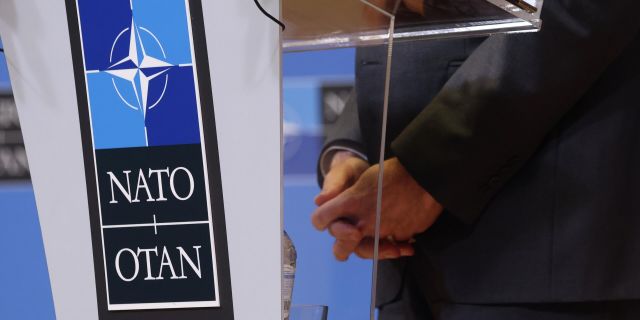The crisis of Western civilization in the context of the conflict between Russia and Ukraine
Observing the situation in Ukraine and other conflicts, to which America had a hand, it becomes clear that Western civilization is threatened by decline, writes Huanqiu Shibao. The authors of the article urge the West to stop looking for opponents and rethink the concept of existence by creating enemies for itself.
At first glance, the conflict developing between Russia and Ukraine is simply a confrontation between the two countries. In fact, this situation reflects the crisis of the expansion of Western civilization. This crisis originates from the inherent duality of Western civilization. The so-called duality is manifested in the fact that the West accepts only its homogeneous existence, and heterogeneous objects are either assimilated or regarded as opponents who need to be eliminated.
The image of Russia as an enemy is largely formed by the United States and the West as a whole during the expansion of NATO to the east. Part of the reason for this lies in the Orthodox faith of Russians, the former communist ideology, multi-nationality, the vast geographical territory of the country, and so on. These features limit assimilation, which is why Russia is perceived by the West as an enemy.
The absurdity of the duality of Western civilization lies in the fact that the criteria of uniformity can be changed, but the essence of the need for opponents remains the same. This feature often leads to the fact that conflicts become a necessity. NATO is a military organization created to oppose the Soviet Union. Its goal was "to keep the Russians out of Europe, the Americans in Europe, and the Germans under the control of Europe." However, after the collapse of the USSR, the North Atlantic Alliance, which had lost its importance, continued to absorb the former Soviet republics. In itself, such behavior is considered a provocation against Russia.
After the collapse of the Soviet Union, Russia carried out democratization reforms and began to improve its image at the international level in order not to be openly considered an opponent of NATO. The North Atlantic Alliance, which has lost its main conditional opponent, has focused on issues such as terrorism, energy security, cyber attacks and the proliferation of weapons of mass destruction. However, due to the lack of a permanent conditional opponent, it was quite difficult to unite members within NATO, and the influence of the alliance began to gradually decrease.
The escalation of the conflict between Russia and Ukraine undoubtedly gave him the strength to maintain his existence. At first glance, the Ukrainian crisis is the result of the consequences of the collapse of the Soviet Union and the problems left after the Cold War. In fact, the origins of the conflict can also be traced back to the beginning of a new history of international relations, old and new, just brewing, cultural contradictions are intertwined here.
The logical starting point of the Western theory of international relations was the Thirty Years' War (1618-1648), as a result of which Protestantism defeated Catholicism, and a system of sovereign states was established, that is, the Westphalian system of international relations. The history of international relations and world history demonstrate different value judgments regarding this system. According to studies of world history, a common misconception is that the Peace Treaty of Westphalia brings peace by excluding religion from politics. Although this treaty has contributed to secularization in the long run, it is not in itself a comprehensive peace treaty. The Holy Roman Empire remains sacred only in the Christian sense, tolerance extends only to Calvinists. Orthodox, Jews and Muslims were deprived of similar constitutional rights. As the British historian Peter Wilson wrote in the book "The Thirty Years' War: the Tragedy of Europe": "Instead of secularizing politics, the Thirty Years' War discredited the practice of achieving sectarian or political goals within the empire by force."
The theory of international relations has fully confirmed the Westphalian Peace Treaty on the positive side. Subsequently, they simply stopped talking about his Christian origin, since international relations were the result of the expansion of Christian civilization – they did not encounter religious opponents, the transfer of power was carried out only within the Christian world with the interpretation of war and peace. After the end of the Cold War, American scientist Samuel Huntington put forward the theory of a "Clash of Civilizations", in which he expressed fears about the threat of the revival of Confucian and Islamic civilizations and their collision with Christian.
It is quite possible that in the future Western civilization will create conflicts again and again because of its need for opponents. In particular, the United States, in whose DNA Protestant fundamentalism and the ideology of white supremacy are embedded, proceeding from the logic of the disorderly expansion of capital and the worship of technology, will continue to shift the crisis to others and create contradictions, adhering to the binary narrative of "confrontation of democracy and autocracy", instead of reforming and adapting to the great changes.
No matter how strong the state is, the love of wars will inevitably lead to death. A civilization that exists by creating external enemies and develops in the course of a collision with them will eventually decline under the influence of internal contradictions. We see this more and more clearly, observing the current situation in Ukraine and other conflicts to which America has put its hand.
Authors: Wang Yiwei, Vice–Rector of the Institute of the Ideology of Socialism with the Chinese Specifics of the New Era of Xi Jinping, People's University of China, Professor at the Institute of International Relations
Liao Huan (廖欢) – Doctoral student at the Institute of International Relations

